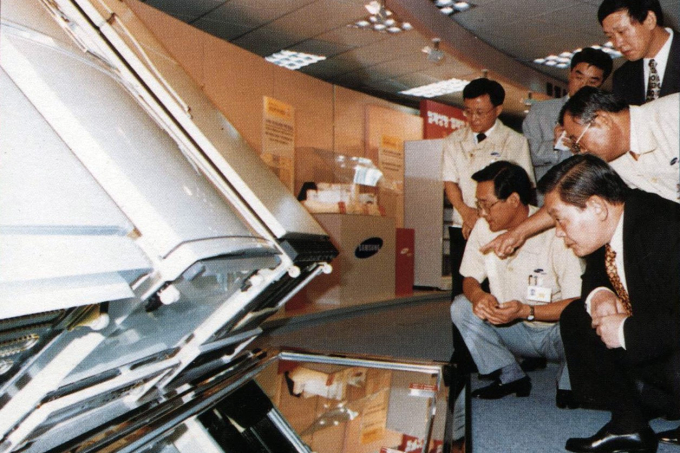Why Lee Kun-hee wouldn't rest, despite global success
By Oct 29, 2020 (Gmt+09:00)
Samsung shifts to emergency mode with 6-day work week for executives


Alibaba eyes 1st investment in Korean e-commerce platform


Blackstone signs over $1 bn deal with MBK for 1st exit in Korea


NPS loses $1.2 bn in local stocks in Q1 on weak battery shares


MBK eyes stake in Korean software developer Tmaxsoft


ŌĆ£Even the world's No. 1 Nokia fell from its throne. We canŌĆÖt be complacent.ŌĆØ
This message was displayed on the monitors installed throughout Samsung Electronics Co.'s Seocho headquarters all day long. Samsung's employees were indifferent, even standoffish when they first saw the message, but the repetition eventually had the desired effect as it kept employees on their toes.
This was in 2014, Samsung's third year holding the No. 1 title in the global smartphone market after beating Apple.┬Ā
Being prepared for any eventuality was Chairman Lee Kun-heeŌĆÖs trademark stance. Lee always instilled tension in Samsung executives and employees by assuming the worst in any situation. Even the 1993 New Management initiative was aimed at transforming the group by imbuing them with a sense of urgency and crisis.
But to his credit, it was Chairman Lee's fear of complacency that drove Samsung to become a global brand and an industry leader, beating rivals Sony and Apple.
NEW MANAGEMENT INITIATIVE THROUGH SHOCK THERAPY
Before Chairman Lee declared the 1993 New Management initiative, he held an in-company product comparison exhibit where Samsung's products were placed next to those of global brands, including Sony, Siemens, Panasonic and Philips. After comparing them, Chairman Lee took a hammer to the Samsung products and ordered the executives to re-create all of them. It was shock therapy, and it succeeded in rattling the executives.

Chairman Lee never allowed himself to rest on his laurels even amid Samsung's thriving success. For example, April 2002 goes down in the Samsung Group's history as a month of celebration as it was the first time the group surpassed Sony's market capitalization as well as exceeding 2 trillion won ($1.7 billion) in operating profit.
But the festive atmosphere soon turned cold when, in the same month, Chairman Lee summoned the chief executives from affiliate companies together for a meeting, bellowing: ŌĆ£I break out in cold sweat when I think about how we're going to survive in five years, and in 10 years.ŌĆØ
Lee had a similar reaction in 2004 when Samsung posted over 20 trillion won in operating profit thanks to a peak in the group's semiconductor business. His pressing message was that the company could not rest on its glory. And Lee's key message for the year was: "We face our biggest crisis now, when things appear to be going so well."
VICE CHAIRMAN FOLLOWS IN FATHER'S FOOTSTEPS
Chairman Lee stepped down from management on Apr. 22, 2008 amid slush fund and bribery allegations. Samsung was facing growing criticism from both the public and political arenas, prompting Lee's exit to protect the company. He was eventually pardoned and returned in full force in 2010.
Lee continued his crisis-preparedness strategy until 2014 when he was hospitalized following a heart attack. That year the key phrase was "mach management," in reference to a jet plane requiring a thorough revamp of its fundamental structure to exceed the speed of sound, or mach number 1, which is about 340 meters per second. It exemplifies Samsung's commitment to reform its structure from the core to survive as the world's leading tech brand.
Chairman LeeŌĆÖs son Jay Y. Lee, the vice chairman of Samsung, inherited his fatherŌĆÖs fear of complacency and preparing for the worst. He has been using the word "crisis" even more often this year during his visits to the group's operations, urging employees to step up and be alert.
Write to Hyung-suk Song at click@hankyung.com
Danbee Lee edited this article.
-
 Lee Kun-hee's legacyHow the Lee Kun-hee mobile phone became a blockbuster
Lee Kun-hee's legacyHow the Lee Kun-hee mobile phone became a blockbusterOct 28, 2020 (Gmt+09:00)
4 Min read -

-
 Lee Kun-hee CollectionLee Kun-hee's art donations: from national treasures to Western masterpieces
Lee Kun-hee CollectionLee Kun-hee's art donations: from national treasures to Western masterpiecesApr 30, 2021 (Gmt+09:00)
6 Min read -
 Why Lee set fire to over 150,000 mobile phones
Why Lee set fire to over 150,000 mobile phonesOct 26, 2020 (Gmt+09:00)
6 Min read


